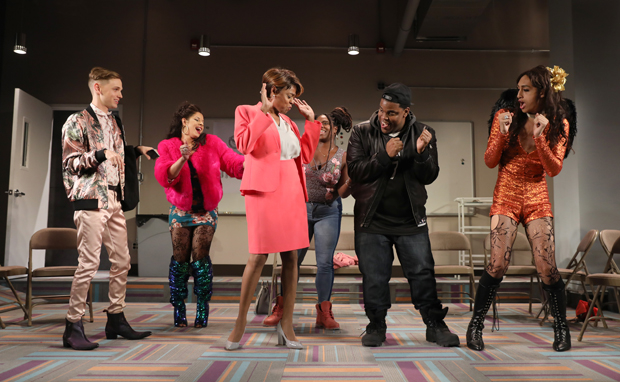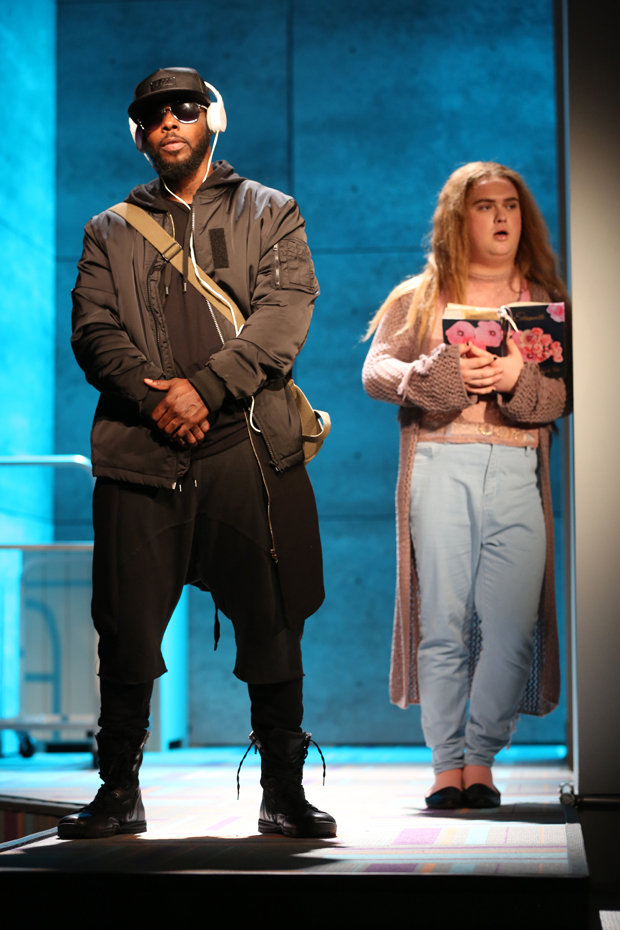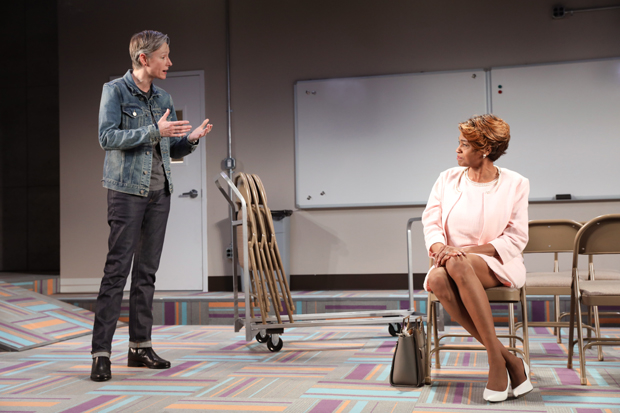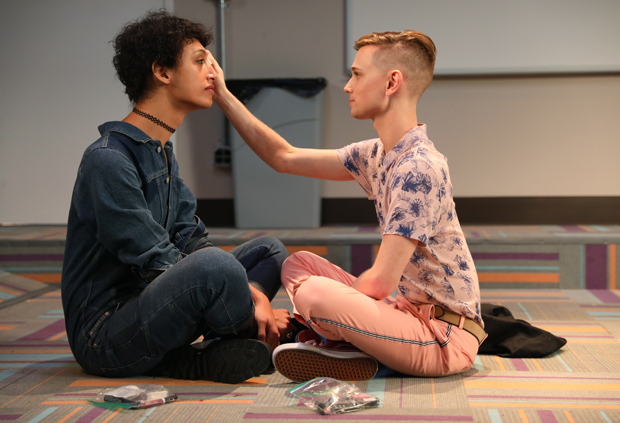Charm

(© Joan Marcus)
Who gets to decide what is “correct” behavior? That question is very much at the heart of Philip Dawkins’s Charm, which is now making its unexpectedly thrilling New York debut with MCC at the Lucille Lortel Theatre. It’s that rare play that is simultaneously funny, smart, and emotionally gripping.
Based on the real story of Miss Gloria Allen, Charm takes place in the L.G.B.T. community center of Chicago. Mama Darleena Andrews (Sandra Caldwell) is a 67-year-old transgender woman who has become disturbed by the uncouth behavior of the trans youth she sees hanging around the Center. She determines to teach a class on charm so that the kids might know how to behave in any social setting, even somewhere as classy as the Drake Hotel. Bearing a dog-eared volume of Emily Post, she sets out to refine the manners of a room full of misfits.

(© Joan Marcus)
The class comprises Ariela (Hailie Sahar), a streetwise trans woman who, at 33, is the oldest in the group. Jonelle (Jojo Brown) is also trans, depending on the day and her mood. Victoria (Lauren F. Walker) and Donnie (Michael David Baldwin) are a straight, cisgender homeless couple who feel most at home at the Center. Beta (Marquise Vilson) is a tough guy who is rumored to be involved in a gang that targets trans women. There’s also Logan (Michael Lorz), a cis-gay man studying at Loyola who clearly comes from money. The rest of them mostly ignore Lady (Marky Irene Diven), a trans woman with hair on her chest and a host of mental health issues.
We question whether the proper handling of an oyster fork is really a necessary skill for people unsure of where they will get their next meal. And even with her mastery of Emily Post, Mama regularly fumbles with the protocol of this queer space, misgendering Center administrator D (Kelli Simpkins convincingly playing a non-binary person who prefers the pronoun “they,” instead of “he” or “she”) by calling them “Miss D.” D is also bothered when Mama refers to herself as an “old tranny,” even though she insists, “Honey, back in my day, ‘Tranny’ was about the nicest thing anyone ever called me.”

(© Joan Marcus)
As Mama, Caldwell gives one of the most heartfelt performances of the year. Her maternal warmth radiates off the stage. “I ain’t never had no trans people to look up to,” Ariela tells her, the unspoken truth being that most trans folk Darleena’s age either never transitioned or are now dead. Mama survived because she is a woman of exceptional strength and perseverance, something that Caldwell effortlessly embodies.
Under the thoughtful direction of Will Davis, plenty of excellent performances emerge over the course of two hours. Vilson’s turn as Beta is particularly gut-wrenching. Sahar astounds us with a late monologue that will likely shock much of the audience. Diven elegantly walks the line between comedy and gravity in portraying a character that is seriously troubled, but also written to be funny.
It might be hard to believe, but Charm is also the funniest play off-Broadway at the moment. Dawkins has a firm grasp on the tea and shade one is likely to encounter in a place like the Center. This artful and cutting language is meant to be hilarious, and it is. These characters aren’t merely repositories for our pity, but have a fierceness that will keep a big grin on your face.
Lighting designer Ben Stanton adds to the fun with his institutional lighting, which regularly fades into something more enchanted without us fully noticing. Oana Botez’s vibrant costumes pop against the bland classroom setting, fashioned by Arnulfo Maldonado. It all tells the story of a group of people who dream about a life more fabulous than the one they currently have. While Dawkins and Davis ground Charm in realistic performances and design, they’re not afraid to employ a little magic so we might understand what that fabulous existence might look like.

(© Joan Marcus)
Most importantly, Dawkins leaves us swimming in crucially relevant questions: What is the purpose of etiquette? And at what point does etiquette become less about fostering comfort and respect, and more about enforcing an exclusionary class system? When does political correctness become etiquette by another name? Dawkins has a real talent for drawing these questions out through real human characters and situations. Charm exercises our brains, or hearts, and our funny bones, resulting in a very satisfying night at the theater.










